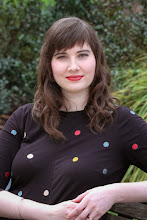About Me

- Rachel E. Watson
- I think, read and write. I might review books, mull on music, spin original poems, share insights or tell stories, but you can be sure whatever you read here comes from a thoughtful and considered place within.
Popular Posts
-
Anne Shirley and Gilbert Blythe. For women of my generation, before we were old enough to even know ourselves, there was the love st...
-
This is the sheet music to Rachmaninoff's "Vespers, Op. 37." This post is about a beautiful kind of classical music I re...
-
Social Media Blues By Rachel Watson I’ve got a deadline. A project due in less than a week. I open my blan...
Blog Archive
-
▼
2014
(57)
-
▼
September
(11)
- Ty Segall: A Soundtrack for Shuffling the Deck
- Creative Nonfiction Dream Story: "Looking for the ...
- ArtPrize 2014: Show Me What's Fleeting and Frail
- Groovy Tuesday: The Bee Gees Before Disco
- Storytelling Sunday: "Trapped Behind the Kitchen D...
- Fine Art Friday: Three Short Poems I Love to Pieces
- Creating Themes: New Parameters for This Blog
- What I Learned from Jot: The GR Writers' Mini-Conf...
- The Stories that Feed My Soul
- My Grandma Donna's Legacy: Listen, Learn and Respond
- Hearing My Grandmother's Voice for the First Time
-
▼
September
(11)











